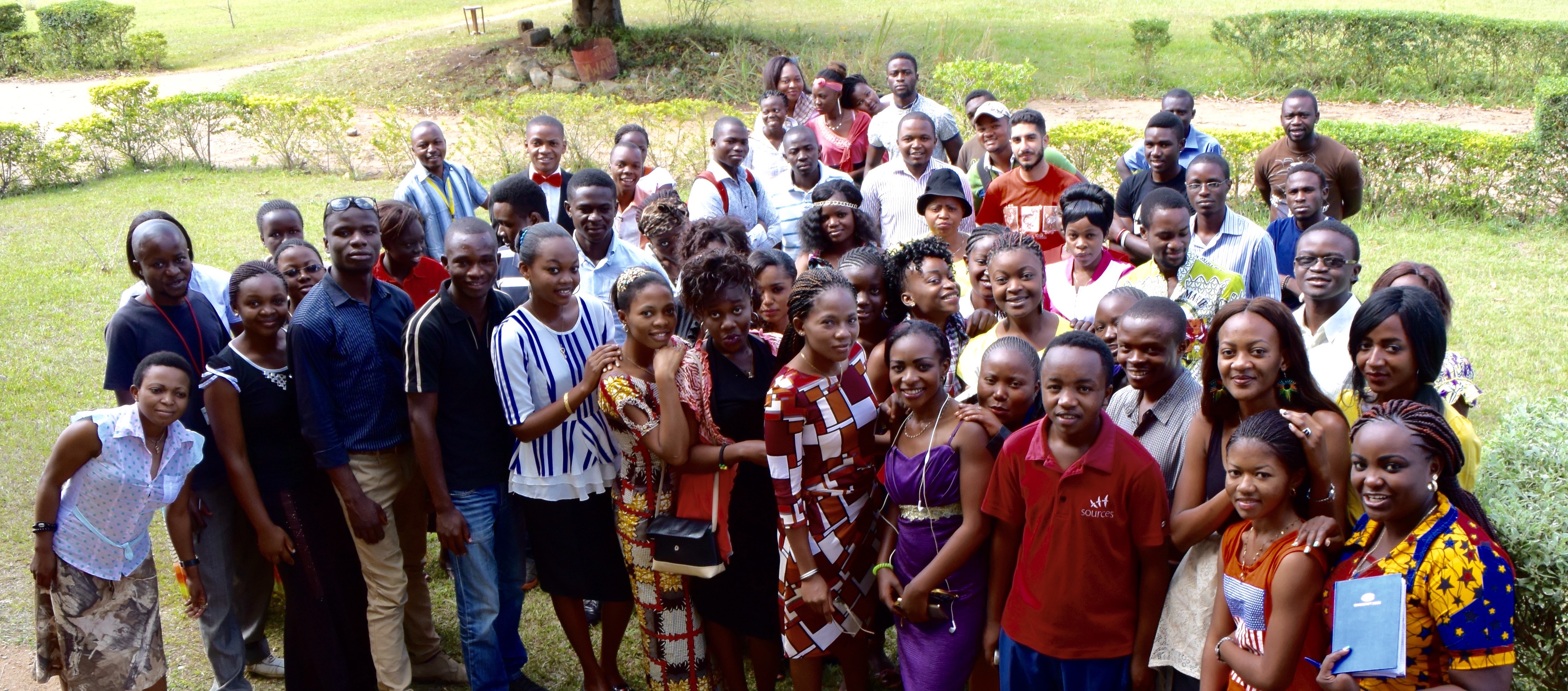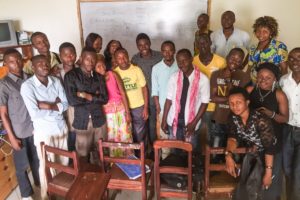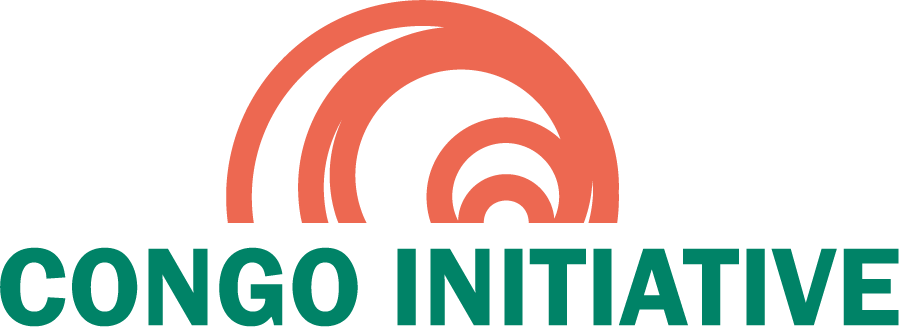
We are young women and men, students studying at the Bilingual Christian University of Congo (UCBC), located in Beni, North Kivu Province, Democratic Republic of Congo. In this year, 2016, we continue to live in a war zone, despite the peace agreements of 2002 that marked the official end of our country’s Great War, and despite the presence of a national government first elected in 2006.
We live in a state of fear and anxiety. Militia groups, neighboring countries’ armies, international peace-keeping organizations, members of our own security forces, bandits, and others with various interests in our instability continue to wreak havoc on our villages, towns, and cities.
Our country is at best a fragile state, and at worst a failed state. In spite of the violence and persistent poverty, we refuse to despair; we live believing that change is possible in Congo. We choose to participate in the development of our country and to envision a future of hope.
We are committed to being a new generation of leaders who will responsibly lead our nation.
We are Congo’s future leaders, in all walks of life, in all our communities, in our government, civil society and faith communities. We can and will be the change we want in Congo.
We are Congo’s Past
Between the 16th and late 19th centuries, our ancestors—young people like us—were seized and brutally taken from this land to be enslaved in the Americas and elsewhere. Between 1885-1915, during the first 30 years of Belgian colonial rule, 10 million of us were beaten, whipped, maimed, and killed; forcibly conscripted to build roads, railroads, and infrastructure for the colonial state to export rubber and other of our abundant resources.
Belgian colonial rule came to an abrupt end in 1960. But independence did little to change the violence and poverty that defined pre-colonial and colonial Congolese society. The European powers remained, joined by new players such as the United States, the Soviet Union, and the Peoples’ Republic of China, seeking to influence our loyalty in the Cold War and to assure a flow of our resources to their industries and consumers.
They (you) are still present, wielding influence and control over us and throughout postcolonial Africa. Our former rulers and new ‘friends’ promised to help develop us after independence, but that help has been largely conditional on the export 0f our wealth and cooperation in their interests. In this, we of course share the blame. But an African proverb affirms: “The hand that gives is always above the hand that receives.”
Between 1996-2002, six African countries and more than 30 militia groups raped, slaughtered, terrorized, and pillaged our country for control over our vast resources. Somewhere between 3-5 million people died. Nobody really knows how many Congolese died. Not many people around the world cared about Congolese deaths at the beginning of the 20th century; not many people cared at the end of the century.
We are Congo’s Present
We know what drove our most recent cycle of conflict and war is primarily our mineral wealth and our abundant and fertile land. We have suffered because we possess strategic and rare minerals that drive high-tech industries. We are induced to trade our minerals for empty promises of ‘development’ and weapons so that certain of our people can control and profit from this exchange. Our leaders bear much responsibility for our condition. They sign agreements in which we are obliged to develop our resources for the benefit of others.
We were told by Belgian colonialists—and the wider world since then—that to be developed was to evolve from being Congolese to being culturally and linguistically something other than Congolese. The goal of our parents’ and grandparents’ generations in being educated in the colonial era was to become Belgian rather than Congolese. To be successful in Congo, we still need to speak and think French and to be someone other than what we see when we look in the mirror. We do not value who we are, what we produce, or how we live. We are at best passive, at worst imitative.
Apart from cultures of poverty and violence, we have inherited very little from our long encounter with the outside world. We possess more than enough resources to live into a good destiny. We have fertile lands in a benevolent climate. We have abundant strategic minerals we can use for our benefit. Yet our poverty is such that we import our food from outside. We allow outsiders to come and exploit us with imbalanced contracts that essentially steal our wealth. Our own leaders have become the new beneficiaries of the old inequalities. Corruption has become our daily bread at all levels of the state, business, and services of all kinds. We are passive when it comes to becoming who we could be, and we are passive in the face of injustices.
We ask ourselves the questions: “Why?” “Who are we called to be and what are we called to do?”
We are Congo’s Future
“Oh beloved country, Congo, we shall make you a country better than before.” This stanza from our national hymn sums up our vision for our country. We will be a voice for our nation and our people. We are committed to being a new generation of leaders who will responsibly lead our nation.
 Living our destiny is not only a dream; it is possible if we truly want it. We have sufficient resources to make our vision a reality. We are endowed with 50 percent of Africa’s rainforests. We have rich, abundant soils, plentiful rainfall, and one of the most extensive riverine systems in the world. Our hydroelectric potential could power all of sub-Saharan Africa; our agriculture has the potential to feed much of our continent.
Living our destiny is not only a dream; it is possible if we truly want it. We have sufficient resources to make our vision a reality. We are endowed with 50 percent of Africa’s rainforests. We have rich, abundant soils, plentiful rainfall, and one of the most extensive riverine systems in the world. Our hydroelectric potential could power all of sub-Saharan Africa; our agriculture has the potential to feed much of our continent.
What we require and what we ask of those who would be our friends are three things: access, knowledge, and transformation. A popular saying states: Instead of giving me a fish to eat today, teach me how to fish and I shall eat everyday. We say that this is not enough. Yes, we need knowledge to know how to fish in the pond. But we then also need access to the pond. We long for the day when our country will have an equal seat at the table in the community of nations, when Congo will participate with self-respect and be respectfully heard. Listen to us; let us listen to one another.
We want to suggest two areas of transformation that we believe would impact our world for the better. The place where we must start is with global arms manufacture and trade, which simply increases violence and the misappropriation and misuse of wealth and power. We and our communities have been terrorized for four centuries by the transfer of weaponry and military technologies from Europe and North America. President Nyerere of Tanzania noted in 1985 (an observation that holds equally true in 2016) that: “All the guns you see in Africa are manufactured in the developed North. Just as there are pushers of drugs in your cities, so there are pushers of guns in our countries.”1 Underdevelopment, poverty, and hunger persist in Congo because of chronic violence and insecurity. We must work towards putting an end to the lucrative global arms manufacture and trade.
Additionally, we need developed countries to end their exploitation of our resources for their benefit. We need both to develop our resources to meet our needs and improve our lives, and then to develop our resources and engage in fair and legitimate trade that mutually benefits both producer and buyer. This requires transformation, and we believe this is best achieved as we come to the table as partners. As more than partners really. We need to recognize that our future is dependent on each other. So we say in Swahili, tukopamoja (we are together).
We long for the kind of collaboration that enables us to achieve our vision. Yes, we are Congo’s future. You, who read our words, are also our future.
Learn how you can support these students through the UCBC Fund.
An essay by students of the Christian Bilingual University of Congo (UCBC), located in Beni, North Kivu Province, in eastern Democratic Republic of Congo (DRC), and originally published by Bread of the World’s 2017 Hunger Report. Dr. Paul W. Robinson, Senior Advisor to Congo Initiative and a professor at UCBC, worked with UCBC students in a course, Global Perspectives. Bread for the World asked students to discuss how the international community can engage more constructively with the DRC to promote poverty reduction and sustainable development. The above is a collated and edited version of the class’s response. Download a PDF version of “We are the Democratic Republic of Congo.”


Bonjour!
Je voudrais savoir comment proceder à la version française de ce document?
This is beautifully written and so true. Arms manufacture and sale benefits no one but the manufacturers themselves.
#Tukopamoja (we are together)
I am proud to be part of this great vision . Yes, we are the Congo’s future, yes, I beleive that something new for our country is getting prepared through UCBC. This essay espresses enought…….